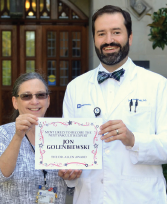Effecting Policy Change

Dr. Allen presented Duke fellow Jon Golenbiewski, DO, now on faculty at Wake Forest Baptist, Winston-Salem, N.C., with the Dr. Allen Award for the Most Likely to Become the Next Vasculitis Expert in 2019.
Dr. Allen explains that part of her motivation to participate in administrative-level hiring and tenure policy changes began as self-defense. She recalls that James Wyngaarden, MD, the chair of the department in 1982, had remarked that her pre-tenure track appointment as associate in medicine would be temporary because she was not the kind of person the institution needed long term. “The meaning [of his remark] to me was: 1) I was a woman, and there were only four or five women faculty then out of 125 in the Department of Medicine; and 2) I was not planning to do bench research.”
Dr. Allen determined to make the best of the situation and entered the tenure track in 1984. Two years later, she and her husband had twins; she reached associate professor with tenure status in 1992, when her twins were 5 years old, and achieved full professor in 1999.
Dr. Allen was also determined “to make Duke a better place” for women coming after her. “There were so few women [on faculty], so one of the scourges of being a minority was I got asked to join and chair committees.”
She willingly agreed, and despite a full clinical and teaching load, she became an active member of many academic and faculty governance committees. She served on the Academic Council (Duke University’s faculty senate) Executive Committee during the first two years of Nannerl O. Keohane’s presidency of Duke; and she chaired the Academic Council from 2002–05—the first woman from clinical sciences and only the second woman in the history of the Academic Council to do so.
Passing the Baton
Dr. Allen became the first chair of the Women’s Committee in the Department of Medicine in the mid-1980s when Joseph Greenfield, MD, asked her to advise him about salary equity, harassment, safety, appointments, promotion and tenure, along with other issues, for women. (Of note, his daughter was just starting her own residency.) Dr. Allen served as chair of that committee, as well as the Rheumatology Fellowship Program Director, for 12 years.
Lisa Criscione-Schreiber, MD, associate professor medicine and co-founder, with Megan Clowse, MD, of the Duke Lupus Clinic, has served as the fellowship program director for the past 12 years and was recently appointed vice chair for education in the Department of Medicine. “We’re very fortunate at Duke that we have a lot of female leadership,” says Dr. Criscione-Schreiber. “That is due in no small part to Nancy’s work in laying the groundwork. She is incredibly supportive of women’s careers and pushed to make sure everyone understands the challenges that women face in academic medicine.”
Dr. Allen is proud to have garnered numerous awards throughout her career, including the Eugene A. Stead Jr. Award for Excellence in Teaching from the Department of Medicine house staff in 1986, Distinguished Faculty Award from the Duke Medical Alumni Association in 1996, the Leonard Palumbo Jr. MD Faculty Achievement Award in 2004 and the Department of Medicine’s Achievement in Rheumatology and Immunology Education Award in 2013, 2019 and 2020.
She has cared for several thousand rheumatology patients, some of them for several decades, at Duke and at outreach clinics in underserved areas of Roxboro and Oxford, N.C.—another testament to Dr. Allen’s commitment to her values about equity.
It’s been difficult, she says, to say goodbye to patients via telehealth due to the pandemic. “Patients are my friends as well. I’ve told some of them that, at some point, when it’s safe for us to go out and meet for lunch, to send me a message. I probably have a little bit of the old country doctor in my makeup!”
Dr. Allen’s time will be filled with a raft of activities, including sorting through files and memorabilia from the past 42 years while writing her memoir. She’s an avid photographer, a pursuit she enjoyed with her late father Paul Bates—and in fact, has taken many of the division’s official portraits over the years.
“I look forward,” she says, “to retiring with emeritus status after such a long, varied and rewarding career.”


